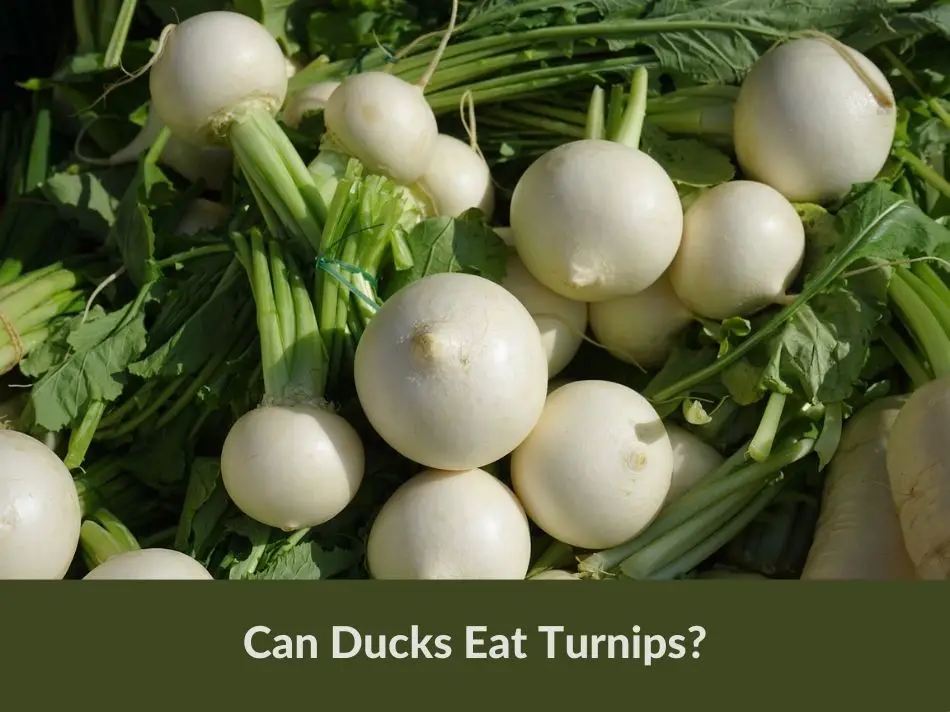Ducks, by nature, are omnivorous creatures. They’ll skim ponds for aquatic plants, nibble on grass, snack on insects, and even enjoy the occasional small fish or amphibian. But, can ducks eat turnips?
Yes, ducks can indeed eat turnips. Turnips are non-toxic and pose no immediate harm to ducks. These healthy crunchy root vegetables can be a delightful treat for them. They can also eat the turnip greens.
In this article, we’ll dive into the delightful world of ducks and their dietary preferences, specifically focusing on turnips. From understanding a duck’s natural diet to the benefits and ways to safely feed turnips to our feathered friends, we’ve got all your quacking questions covered.
How Often Can I Feed My Ducks Turnips?
While turnips can be a tasty treat, they shouldn’t replace a duck’s primary diet. It’s best to offer turnips as an occasional snack. Think of it as the duck equivalent of us enjoying a special dessert! Once or twice a week is sufficient.
Can Ducklings Eat Turnips?
Ducklings have different dietary requirements than mature ducks. While turnips aren’t harmful to ducklings, they might find them challenging to eat due to their hard texture. If caretakers wish to introduce turnips to ducklings, it’s best to serve them finely grated or mashed.
Make sure the portions are small, easily digestible, and always monitor the ducklings during feeding to avoid any choking hazards.
Turnips Nutritional Value
Below is the nutritional value of 100 grams of turnips.
- Calories: 28
- Protein: 0.9 g
- Carbohydrates: 6.43 g
- Dietary Fiber: 1.8 g
It also contains several vitamins and minerals as listed below.
- Vitamin C
- Folate
- Phosphorus
- Calcium
Are Turnips Healthy for Ducks?
Turnips do come packed with nutrients. They offer vitamins like Vitamin C and minerals like calcium and phosphorus. All these play a role in keeping a duck’s beak, feathers, and bones healthy.
- Vitamin C: Ducks can benefit from Vitamin C just like humans. It enhances their immune system, promoting overall health. Additionally, Vitamin C aids in the production of collagen, which is essential for the health of their feathers, beaks, and bones.
- Folate (Vitamin B9): Folate is critical for ducks, especially during their early growth stages. It ensures proper neural tube formation in ducklings and aids in DNA synthesis and repair. For egg-laying ducks, folate can improve egg quality and production.
- Phosphorus: An essential mineral, phosphorus plays a key role in bone and teeth formation in ducks. It’s also crucial for energy production and the efficient utilization of nutrients, helping ducks maintain their energy levels.
- Calcium: Calcium is vital for duck health. It strengthens their beaks and bones and is fundamental for egg-laying females. A good calcium intake ensures strong eggshells and helps prevent health issues like “limber neck.”
How To Feed Turnips To Ducks
- Wash and Prep: Begin by thoroughly washing the turnips to remove any dirt or pesticides. Organic turnips are preferable as they have fewer chemicals.
- Size Matters: Ducks prefer bite-sized pieces that are easy to swallow. Cut the turnips into small chunks, ensuring they’re suitable for the duck’s bill. For ducklings or smaller duck breeds, you might want to grate the turnips or cut them into even finer pieces.
- Raw or Cooked: Turnips can be fed raw, which preserves most of their nutritional benefits. However, if you notice that your ducks struggle with the hard texture, you can lightly steam the turnips to soften them. Avoid adding any seasonings or oils.
- Monitor Portions: While turnips are a treat, they shouldn’t dominate the duck’s diet. Offer moderate amounts, observing how eagerly the ducks eat them and adjusting quantities based on their interest.
- Always Provide Water: When introducing any new food, always ensure ducks have access to clean, fresh water. Ducks use water to aid in swallowing and digestion, and it’s especially important when they’re consuming foods outside of their regular diet.
More Vegetables Ducks Can Eat
Ducks have a surprisingly diverse palate, and many vegetables are safe and beneficial for them to consume. These veggies not only provide essential nutrients but also add variety to their diet, ensuring they’re as happy as they’re healthy.
Conclusion
Turnips can be a healthy and enjoyable treat for ducks when fed in moderation. Whether you are a caretaker or a park visitor, make sure to cut the turnips into smaller pieces to prevent the ducks from choking. And always feed near or in water to mimic their natural foraging instinct.
Disclaimer: The information in this article is for informational purposes only. I'm not an expert or a veterinarian.


